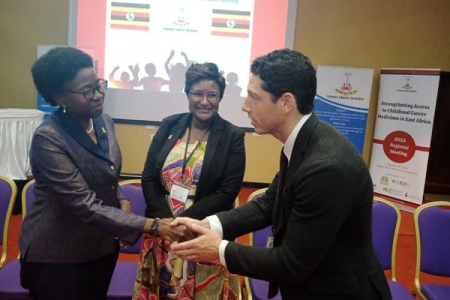Aga Khan, UCI top in cancer care – report 2023-05-08
Aga Khan University Hospital is the best cancer treatment centre in East Africa in terms of uninterrupted access to essential cancer drugs, a new international study has revealed.
The hospital scored highly for both public and private care.
However, the Uganda Cancer Institute (UCI) emerged as public health facility in terms of availability of cancer drugs.
This was revealed yesterday in Kampala during the two-day International Conference on Childhood Cancer. The study was done by experts at the Access to Childhood Cancer Essentials (ACCESS) initiative, a global collaboration aimed at increasing the survival rate for children with cancer.
Dr Avram Denburg, a specialist in childhood cancer from Canada, who presented the report at the conference, said the study was done in eight cancer treatment centres in Kenya, Tanzania, Rwanda and Uganda.
Dr Avram said the study was done by local investigators who assessed drugs that were available, those that were not available, and price of childhood cancer drugs. He said although countries Uganda performed well in the ranking some important medicines were not available.
“Stockouts were evident at both urban and rural sites, academic and community hospitals, and public and private institutions,” the report stated.
From the lowest to highest stockout cases, the ranking were as follows: Aga Khan University Hospital (15 percent), UCI (19 percent), Kenya’s Moi University Teaching and Referral Hospital (21.6 percent) and Tanzania’s Muhimbili National Hospital (23.7 percent). This was followed by Tanzania’s Bugando Medical Centre (32.3 percent), Rwanda’s Butaro Cancer Centre of Excellence (39 percent), Kenyata National Hospital (44.5 percent) and Jaramogi Oginga Odinga Hospital (48.5 percent).
In Uganda, five cancer drugs out of 27 medicines were not available. This is lower than Aga Khan University Hospital with only four out of 27 medicines out of stock by the time of the study. But for Jaramogi hospital, as high as 11 drugs were out of stock and the availability of other drugs was also not consistent during the study period, according to the report. The cancer drugs that were not at the UCI during the study period include pegaspargase, trioguanine, procarbazine, irinotecan and cyclophosphamide (oral).
Commenting on the report during the conference, Dr Jackson Orem, the executive director of the UCI, said the institute has been able to achieve much because of increased government funding and support from partners.
“The UCI has put measures in place to ensure medicines are readily available to all patients, both young and old, at no cost,” Dr Orem said, adding, “We are working directly with manufacturers and eliminating middlemen -something that has enabled us to achieve free access to medicines without drug stockouts.”
Covid-19
According to Dr Orem, during the Covid-19 pandemic, when countries were worried about access to medicines, “the institute was fully stocked with no worries of stock outs”.
Dr Jane Ruth Aceng, the Health minister, said UCI is excelling because the government made it an autonomous body that can procure its own medicines and they are collaborating well with the National Drug Authority.
She said the availability of cancer drugs at the institute is at 90 percent, meaning some people may still be asked to buy the few drugs that are not available.
“I want to thank the management of UCI for this policy environment to ensure there are medicines for Ugandans with cancer,” she said.
20% survival rate
Citing data from the World Health Organisation, Dr Joyce Kambugu, the head of pediatric cancer department at UCI, said
globally, 429,000 childhood cancer cases are registered annually and of this, 40 percent are in Africa.
She said around 3,000 children develop cancer every year in Uganda with 600 coming to UCI.
«Only around 20 percent of children with childhood cancer survive in Africa compared to 80 percent in developed countries,” she said.
Dr Kambugu said they are targeting to increase the survival rate for childhood cancer in Africa to 60 percent by 2030. She highlighted poverty, long distance to Kampala-based treatment centres, toxic effects of drugs as some of the major contributors to treatment abandonment and failure among children with the disease.
“Some of these gaps can be addressed. This is the purpose of this meeting. In Uganda, we have a lot of misdiagnoses, delayed initiation of treatment, and toxic effects of the medicines,” she said, adding, “Limited resource envelope is not the main reason, we lack prioritisation. If a drug is only used by children then prioritisation is low. When the budget is cut, children are forgotten.”
Dr Avram Denburg, a specialist in childhood cancer from Canada, said there is a need for East African countries to unite and do pooled procurement of cancer drugs. He said this would increase the bargaining power of the countries. He also advised countries to have clear data on childhood cancer and drugs needed to treat the diseases for ease of advocacy.
- 277 reads
 Ismaili.NET - Heritage F.I.E.L.D.
Ismaili.NET - Heritage F.I.E.L.D.